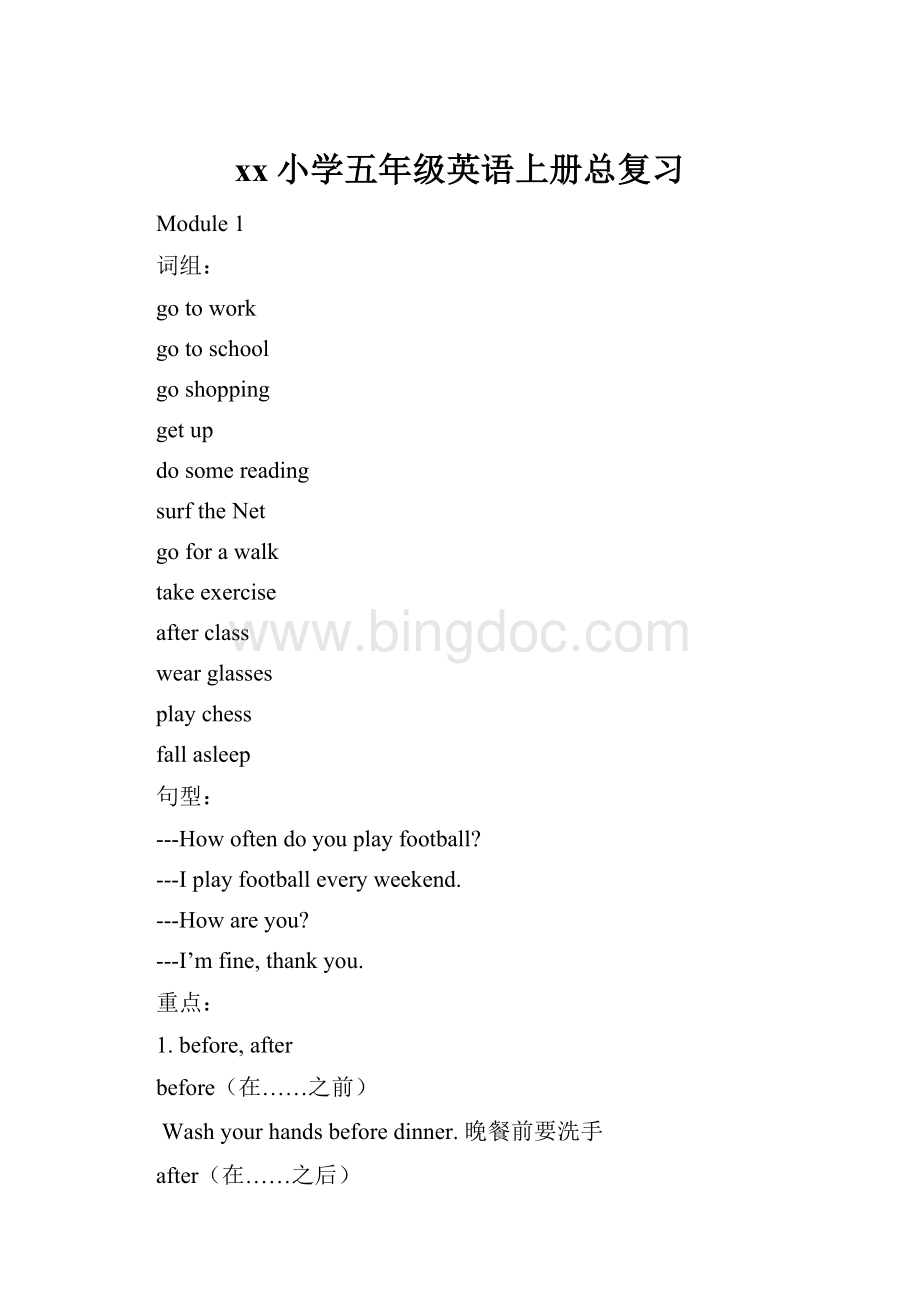xx小学五年级英语上册总复习.docx
《xx小学五年级英语上册总复习.docx》由会员分享,可在线阅读,更多相关《xx小学五年级英语上册总复习.docx(12页珍藏版)》请在冰点文库上搜索。

xx小学五年级英语上册总复习
Module1
词组:
gotowork
gotoschool
goshopping
getup
dosomereading
surftheNet
goforawalk
takeexercise
afterclass
wearglasses
playchess
fallasleep
句型:
---Howoftendoyouplayfootball?
---Iplayfootballeveryweekend.
---Howareyou?
---I’mfine,thankyou.
重点:
1.before,after
before(在……之前)
Washyourhandsbeforedinner.晚餐前要洗手
after(在……之后)
Let’splaytogetherafterschool.放学后我们一起玩
2.一般现在时
一般现在时表示:
1.经常发生的动作或存在状态,常和always(总是),usually(通常),often(经常),sometimes(有时候),everyday(每天),everyweek(每周)等时间状语连用。
2.表示普遍真理
一、陈述句:
肯定句:
A、主语+be动词~
1. Iamateacher. 我是老师
2. MybirthdayisonOctober1st我的生日在十月一日
B、主语+动词~
IoftenplayfootballonSundays.我经常在周日踢足球。
※第三人称单数+动词-s或-es.:
Shelikessummer.
否定句:
A,主语+be动词+not~
Youarenotastudent.你不是学生。
B,主语+donot+动词~
Idon’tgotoschooleveryday.我每天不去上学。
※第三人称单数+doesnot+动词~
Shedoesn’tgoshoppingonSaturdays.她在周六不购物。
二、一般疑问句 (句型、用法)
陈述句变一般疑问句时,
1.把be动词移到主语前面,即Be动词+主语~
如:
-----Areyouastudent?
-----Yes,Iam.
2.把do或does移到句首,即Do(Does)+主语+动词原型~
如:
----DoyouhaveEnglishclassonMondays?
---No,wedon’t.
----Doesheplayfootballeveryday?
---Yes,hedoes.
(练习,按要求做题)
1. Iamateacher.(变成否定句)
2. Youarestudent. (变成一般疑问句)
3. WehavemathclassonTuesday.(变成一般疑问句)
掌握
1.各季节、月份、节日的单词
2.序数词
3.日期表达方法
季节
spring春天summer夏天
autumn秋天winter冬天
月份
一月:
January
二月:
February
三月:
March
四月:
April
五月:
May
六月:
June
七月:
July
八月:
August.
九月:
September
十月:
October
十一月:
November
十二月:
December
序数词
first(第1)
second(第2)
third(第3)
fourth(第4)
fifth(第5)
sixth(第6)
seventh(第7)
eighth(第8)
ninth(第9)
tenth(第10)
eleventh(第11)
twelfth(第12)
thirteenth(第13)
fourteenth(第14)
fifteenth(第15)
sixteenth(第16)
seventeenth(第17)
eighteenth(第18)
nineteenth(第19)
twentieth(第20)
其他重点:
at,on,in的用法和区别
at:
(用于表示时刻、时间的某一点)
atnine(o’clock)在九点 at6:
30
on:
(用于表示具体的某一天,具体某天的上午或下午)
onMonday 在周一 onTuesdaymorning 在周二的早上
onJune6th在六月六号ontheweekend在周末
in:
(用于月、年、季节,泛指的上午或下午)
inMay inJuly
insummer inwinter
in1996 in2008
inthemorning intheafternoon
(练习,填入合适的介词)
1.Igotobed 9:
30.
2.WehaveEnglishclass 10:
00
3.Ioftenplaythepiano Sundays.
4.Teacher’sdayis September.
5.Mybirthdayis December12th.
补充:
节日
NewYear’sDay元旦Women’sDay妇女节
MayDay劳动节Children’sDay儿童节
ArmyDay建军节Teachers’Day教师节
NationalDay国庆节
Module2
1.Can表示能力:
“能,会,可以”它没有人称和数的变化,它后面必须跟动词原型。
can(能、会) cannot=can’t(不能、不会)
如:
Thebirdscanfly. Thecatscan’tfly.
Icanmakeasnowman.Ican’tswiminthesea.
2.verywell,well,quitewell,notverywell,notatall
如:
Theladycanplaytennisverywell.
Themancanplayfootballwell.
TheycanspeakJapanesequitewell.
Thegirlcan’tskateatall.
Module3
单词(植物名称)
banyan榕树
pinetree松树
kapok木棉
rose玫瑰
lily百合花
tulip郁金香
sunflower向日葵
bulebell风铃草
violet紫罗兰
cityflower
词组
ofcourse
takephotos
takearest
lineup
pickflowers
climbtrees
sitonthegrass
listentotheradio
rideabike
takeawalk
takegoodcareof
重点:
1.can允许,mustn’t不允许
Youcanrideabike.Youcanwalkdogshere.
Youmustn’tpicktheflowers.Youmustn’twalkonthegrass.
2.现在进行时
表示现在正在进行的动作。
时间标志:
now,listen,look
一、陈述句结构:
主语+be动词+现在分词~(现在分词是:
动词+ing)
如:
1.IamwatchingTVnow.我正在看电视。
2.Weareplayingchess.我们正在下棋。
二、否定句和疑问句 (句型、用法)
否定句:
主语+benot+现在分词~
如:
1. Iamnotpickingupleaves.我没有摘树叶。
2. Sheisn’twritingareport.她没有在写报告。
疑问句:
Be动词+主语+现在分词~
如:
1. Areyoutakingpictures?
你(们)正在照相吗?
2. Ishecollectingleaves?
他正在收集树叶吗?
三、特殊疑问句 (句型、用法)
结构:
特殊疑问词+be动词+主语+现在分词~
如:
1.Whatareyoudoing?
你(们)正在干什么?
2.WhatisJohndoing?
约翰正在干什么?
动词的现在分词构成:
构 成 法
例 词
一般加-ing(以y结尾也直接加ing
walk----walking
fly----flying
以e结尾的词去e后加-ing
write----writing
have----having
take----taking
以重读闭音节结尾,或末尾只有一个辅音字母的词,要双写这个辅音字母,再加-ing
run----running
swim---swimming
以ie为结尾的重读开音节的词,改ie为y,再加-ing
die----dying
Module4
词组:
leaveforonfoot
adaytripshoppingcentre
句型:
----Howcanwegetto…?
/Howareyougoingtogetthere?
----Byplane/train/bus/car/bike/underground/ship.(Onfoot)
时间表达方式:
7:
00seveno’clock12:
05fivepasttwelve
6:
15aquarterpastsix8:
40twentytonine
2:
30halfpasttwo
一般将来时
一.意义:
表示将来某个时间要发生的动作,常与表示将来的时间状语连用。
如tomorrow,soon,nextMonday,nextyear,nextweekend,thisafternoon,thisevening……
二.构成及变化【一般将来时常用的两种结构】
1.begoingto+动词原形(打算做的事/即将发生/肯定要发生的事)
.肯定句 :
主语+be(am/,is,/are)goingto+动词原形+其它
MysisterisgoingtolearnEnglishnextyear.姐姐准备明年学英语。
.否定句:
主语+be(am/is/are)notgoingto+动词原形+其它
Iamnotgoingtothecinematonight.我今天晚上不去看电影。
.一般疑问句:
Be(am/is/are)+主语+goingto+动词原型+其它?
Isyourfathergoingtoplaybasketballwithyou?
No,heisn’t.
.特殊疑问句:
特殊疑问词(Wh-)+一般疑问句?
WhereareyougoingtospendSpringFesital?
春节你打算在哪过?
2.will+动词原形(将要发生的动作或情况,较少计划性,还用来表示意愿)。
.肯定句:
主语+will+动词原形+其它成份
I(shall)writetohimnextweek.下周我将给他写信。
.否定句:
主语+will+not+动词原形+其它成份
Theywon’twatchTVthisevening.今天晚上他们不看电视。
.一般疑问句:
will+主语+动词原形+其它成份
Willyoustayathomewithustomorrow?
明天呆在家里好吗?
.特殊疑问句:
特殊疑问词(Wh-)+一般疑问句
Whenwillyourfatherbeback?
你爸爸什么时侯回来?
Module5
单词
动物:
panda,bear,lion,elephant,giraffe,deer,
snake,kangaroo,frog,turtle,monkey
各大洲:
Africa,Europe,Asia,
NorthAmerica,SouthAmerica,theAntarctic
词组:
Whynot?
(Whynotgotothezoothisweekend?
)
Whoknows?
谁知道呢?
句型:
----Whereis…from?
(Whereisthepandafrom?
)
----It’sfrom….(ItisfromChina.)
祈使句(表示请求、命令、建议、禁止等,用动词原型)
Comehere.
Don’tforget.
Don’tbelate.
Module6Directions
(单词)场所:
hotel,trainstation,policestation,
bookshop,restaurant,postoffice,
bank,market,cinema,
hospital,gym,lab
句型:
I’mlost.我迷路了。
bytheway顺便说一下
问路:
----Excuseme,couldyoutellmethewaytothezoo?
----Canyoutellmehowtogetto…?
回答:
gostraightahead
takethefirstleftturnright/left
It’sonyourright.
Youcanwalkthere/gothereonfoot/takeaNo.1bustogetthere.
----Thankyou,
----You’rewelcome.
一、特殊疑问词
what(什么)who(谁) which(哪个)where(哪里)
why(为什么)whose(谁的)when(何时)how(如何)
Howmany(多少个)Howmuch(多少钱)
What引导的疑问句
1. What’syourname?
2. Whatareyoudoing?
3.Whatdoyoudoontheweekends?
4.Whatwouldyoulike?
5.Whatcolorisit?
6.Whatistheweatherliketoday?
who引导的问句
1.Whocancleantheroom?
2.Whoisshe?
3.Whoisthat?
Which引导的问句
1.Whichbikedoyoulike?
2.Whichseasondoyoulikebest?
Where引导的问句
1.Whereismykey?
2.Wherearethey?
why引导的问句
1.Whydoyoulikesummer?
whose引导的问句
1.WhoseT-shirtisthis?
2.WhosebirthdayisinJune?
when引导的问句
1. Whenisyourbirthday?
2.WhenisTeacher’sday?
3.Whendoyougetup?
How引导的问句
1.Howoldareyou?
2.Howaboutyou?
Howmany引导的问句
1.Howmanybooksdoyouhave?
2.Howmanystudentsarethereinyourschool?
Howmuch引导的问句
1.Howmuchisit?
2.Howmucharethey?
How,what引导的感叹句:
1.Howbeautiful!
2.Whatabigfish!